Unraveling the Complexities of High-Net-Worth Investment Management
High-net-worth investment management is a customized service designed to meet the financial objectives of individuals with significant assets. This segment often has complex goals, ranging from sustaining a particular lifestyle to preserving and growing multigenerational wealth. To manage such portfolios effectively, individuals typically work with wealth managers who specialize in the nuances of private investment management.
Partnering with professionals experienced in this area allows for access to personalized strategies tailored to your specific circumstances. These advisors offer planning across asset allocation, risk management, and tax-efficient investing, helping navigate the intricacies associated with substantial wealth. Their expertise supports the development of long-term strategies that align with evolving financial goals and market conditions.
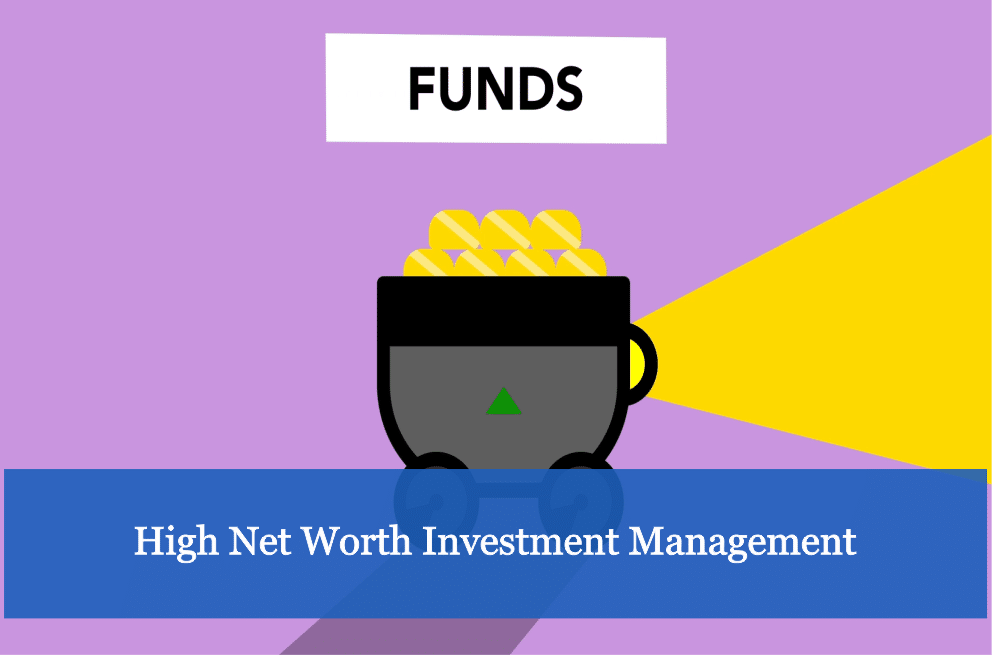
Table of Contents
- Unraveling the Complexities of High-Net-Worth Investment Management
- The Expertise of Wealth Managers in High-Net-Worth Investment Management
- Understanding the Concept of Net Worth
- The Challenges Associated with High-Net-Worth Investment Management
- Demystifying High-Net-Worth Investment Management
- Role of High-Net-Worth Investment Management
- Fees and Income in High-Net-Worth Investment Management
- Choosing the Right High-Net-Worth Investment Manager
- Here Are Some Strategies That Will Help You Minimize Advisory Costs and Fees
The Expertise of Wealth Managers in High-Net-Worth Investment Management
Wealth managers are specialized financial professionals who offer comprehensive high-net-worth investment management services. Their core clientele includes high-net-worth and ultra-high-net-worth individuals, helping them manage and preserve their wealth for long-term stability and growth.
What distinguishes wealth managers from other types of advisors is their multidimensional approach. While some financial planners may focus primarily on retirement planning or budgeting, wealth managers offer a broader range of services—such as tax strategies, estate planning, risk management, and private investment management—designed to meet the complex financial needs of individuals with substantial assets.

Understanding the Concept of Net Worth
Every individual has different financial aspirations. Some aim to accumulate enough wealth for comfort and occasional luxury, while others prioritize sustained growth and the ability to support a high-expenditure lifestyle. High-net-worth and ultra-high-net-worth individuals are typically aligned with the latter objective.
The definition of net worth can vary, but generally, a high-net-worth individual is someone with at least $500,000 to $1 million in investable assets, excluding their primary residence. In contrast, an ultra-high-net-worth individual typically holds $30 million or more in total net assets.

The Challenges Associated with High-Net-Worth Investment Management
Despite having access to more opportunities than individuals with moderate wealth, high-net-worth individuals face a distinct set of challenges throughout their careers and into retirement.
These challenges include:
- Expanding Your Portfolio:
High-net-worth individuals often diversify their investments across asset classes to support long-term growth. However, without a clear strategy, excessive or unbalanced diversification can lead to unexpected risk exposure and potential losses. - Protecting Your Wealth:
Wealth preservation is a core focus of high-net-worth investment management. Market volatility, legal claims, or unexpected costs, such as medical expenses, can affect portfolio stability. A proactive risk management approach is essential to reduce exposure and maintain financial security. - Achieving Your Dream Retirement:
Retirement planning for high-income earners often requires complex coordination of assets, income strategies, and tax considerations. Without a structured plan, achieving specific retirement lifestyle goals may become more difficult. Working with a qualified wealth manager can support long-term planning that is aligned with your retirement objectives. - Passing on Your Wealth:
Effective estate planning is vital for high-net-worth individuals who wish to ensure assets are distributed according to their intentions. Without legally documented plans, wealth may be subject to probate delays or unintended distribution outcomes. - Managing Taxes:
Individuals with significant wealth often fall into higher tax brackets and may be subject to estate, gift, or capital gains taxes. Tax-efficient strategies—such as income shifting, charitable planning, and structured withdrawals—can help manage the overall tax burden while maintaining portfolio performance.

Demystifying High-Net-Worth Investment Management
High-net-worth investors can address key financial challenges with the support of wealth management services—a comprehensive suite of solutions focused on preserving and growing wealth over time.
These services typically include:
- Asset management
- Portfolio analysis
- Retirement planning
- Estate planning
- Insurance planning
- Tax planning
Each of these services plays a role in supporting the complex financial needs of high-net-worth individuals. For example, portfolio analysis can help align asset allocation with long-term goals, while estate planning ensures that wealth is transferred efficiently and according to intent
Role of High-Net-Worth Investment Management
Wealth managers are financial professionals who provide a range of services designed for individuals and families with substantial assets. They primarily support high-net-worth and ultra-high-net-worth clients by helping them structure, protect, and plan their wealth with a long-term perspective.
What distinguishes wealth managers from general financial advisors is their multidisciplinary approach, offering integrated strategies across investment management, tax planning, estate structuring, and more—tailored to the unique needs of individuals with significant wealth.
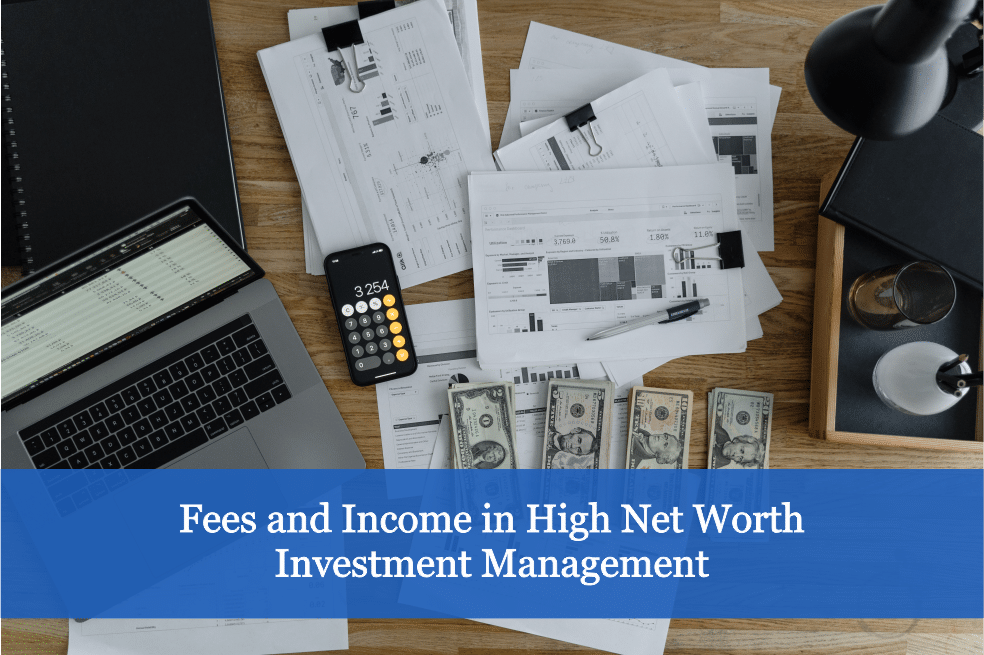
Fees and Income in High-Net-Worth Investment Management
The cost of high-net-worth investment management may raise questions for prospective clients. Wealth managers often apply a fee-based structure, typically calculated as an annual percentage of assets under management, rather than hourly or flat fees. This model enables high-net-worth individuals to access comprehensive management services while aligning the advisor’s compensation with portfolio performance and value.
Wealth managers typically charge between 1% and 2% of the client’s managed assets, depending on the scope of services provided and the complexity of the portfolio. This approach reflects industry standards for fee-based investment advisors serving clients with substantial wealth and long-term planning needs.
Choosing the Right High-Net-Worth Investment Manager
Professional high-net-worth investment managers understand the complexities of managing substantial wealth. They are equipped to navigate evolving market conditions and offer insights that help align investment strategies with long-term financial goals. Whether focused on growth, preservation, or a balanced strategy, these professionals aim to create tailored approaches that reflect each client’s financial objectives and risk tolerance.
Selecting the right wealth manager is a key decision in private investment management. Although the search may feel overwhelming, identifying a professional who specializes in serving high-net-worth individuals is achievable with the right approach.
Here are some steps to guide the process:
A valuable starting point is to consult your network for recommendations. Individuals who have worked successfully with an investment manager may offer insight into the quality of service and planning approach, helping you identify potential advisors who understand high-net-worth financial planning.
Online tools and directories can also assist in your search. Many platforms allow users to filter by specialization, helping you locate professionals who focus on high-net-worth clients and offer services such as tax planning, estate strategies, and portfolio management.
In your evaluation, consider whether the advisor operates under a fee-based compensation model and has relevant experience working with clients in similar financial situations. Some individuals seek advisors who uphold a fiduciary standard, though definitions of fiduciary duty and required disclosures may vary. You may inquire about credentials such as the Certified Financial Planner (CFP) designation or request written information outlining the advisor’s responsibilities and planning approach.
Meet with shortlisted advisors to assess compatibility, clarify service offerings, and explore how their strategies are structured to address your goals, risk profile, and investment preferences.
The right wealth manager will help you define your objectives and maintain a strategy that adjusts over time. Through ongoing portfolio monitoring and disciplined asset allocation, they can respond to market shifts while keeping your long-term plan on track.

Here Are Some Strategies That Will Help You Minimize Advisory Costs and Fees
The following considerations are rarely discussed in depth unless specifically asked. Some advisors may provide only partial answers, not out of intent to mislead, but due to limited experience or training. In many cases, responses are based on standard talking points rather than deep cost analysis.
A commonly asked question is, “What are your fees?” However, a more complete version of this question would be, “What are all the costs associated with managing my investments?”
Most fee-based investment advisors charge an annual percentage of assets under management, typically ranging between 1% and 2%. However, these fees represent just one part of the total cost of investing. Additional expenses—such as fund management fees, trading costs, and tax inefficiencies—can significantly impact long-term outcomes.
Every dollar conserved from avoidable costs remains in your portfolio, continuing to work toward your goals and potentially supporting a more secure retirement or legacy strategy.
Over time, these incremental costs can compound into substantial amounts, sometimes totaling tens or even hundreds of thousands of dollars, especially for high-net-worth individuals with large portfolios. Identifying and managing these expenses is a key part of private investment management.
Let’s explore some of the often-overlooked costs associated with investment management—even those that may not have been brought up by your current advisor or firm.
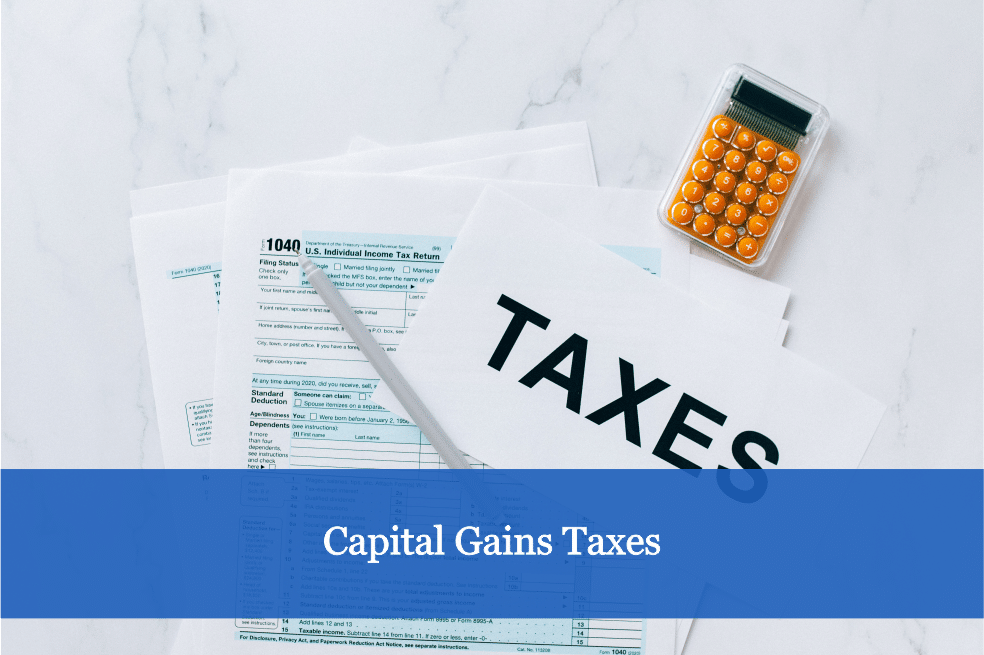
Cost 1: Capital Gains Taxes
In 2019, the top federal income tax rate was 37%, while the maximum rate on long-term capital gains was 20%.
The term “long-term” is key—it refers to investments held for more than one year. If an investment manager maintains a long-term strategy, gains from those investments may qualify for the lower long-term capital gains tax rate.
In contrast, if an investment manager frequently buys and sells securities in an attempt to time the market, any resulting gains may be classified as short-term capital gains, which are taxed as ordinary income. For individuals in the highest tax bracket, this means a potential tax rate of up to 37% on those gains.
To understand the impact, consider this simplified comparison:
Scenario 1: Active Strategy
- Portfolio: $1,000,000
- Return: 10% (with short-term gains)
- Gain: $100,000
- Tax (37%): $37,000
- Net Gain: $63,000
- Final Portfolio Value: $1,063,000
Scenario 2: Long-Term Strategy
- Portfolio: $1,000,000
- Return: 8% (with long-term gains)
- Gain: $80,000
- Tax (20%): $16,000
- Net Gain: $64,000
- Final Portfolio Value: $1,064,000
Even with a lower return, the long-term approach results in a higher net gain due to favorable tax treatment. When scaled to portfolios of $5 million, $10 million, or more, these differences can be significant.
This example highlights how frequent trading strategies can potentially erode net returns through higher tax exposure, particularly for high-net-worth individuals. A thoughtful approach to capital gains management is a key component of tax-efficient investment planning.
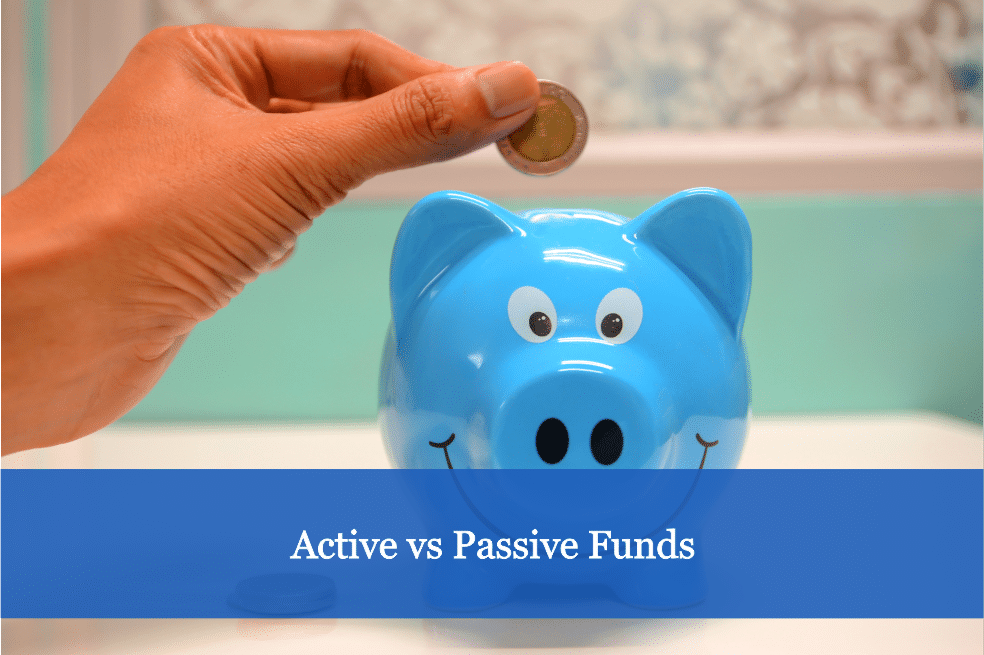
Cost 2: Active Vs Passive Funds
The way your capital is allocated can significantly influence long-term investment outcomes. Many investment advisors allocate client assets to third-party fund managers—yet not all investment vehicles are created equal, and not all are cost-effective for every investor.
There are two primary types of fund management strategies: active management and passive management.
Active managers aim to outperform a market index by making targeted investment decisions based on market research, economic analysis, and forecasting. Passive managers, on the other hand, seek to track a specific index—such as the S&P 500—by mirroring its holdings. If the index rises 5%, a passive fund would reflect that same gain, minus its lower expenses.
The key difference lies in cost. Active funds tend to carry higher fees due to their research and trading activity, often ranging from 0.60% to over 2% annually. In contrast, many passive index funds carry lower expense ratios, sometimes as low as 0.07% to 0.2%.
Here’s an example:
Portfolio Size: $2 million
- Active Fund (1% annual fee):
Annual Fee: $20,000
10-Year Fee Total: $200,000 - Passive Fund (0.2% annual fee):
Annual Fee: $4,000
10-Year Fee Total: $40,000
Cost Difference Over 10 Years: $160,000
This example does not factor in performance differences—only fee structures. The difference becomes more substantial as assets grow, particularly for high-net-worth individuals with portfolios in the multimillion-dollar range.
According to public commentary by Warren Buffett, investors collectively paid over $100 billion in fees to active managers between 2007 and 2017, often without achieving superior returns.
Now, consider the compounded effect of high fees and short-term capital gains from frequent trading. In some cases, investors may pay several times more in fees and taxes for the same underlying investment performance.
Understanding the full cost structure—beyond just advisory fees—is essential in evaluating whether your current investment strategy supports long-term, tax-efficient wealth growth.

Cost 3: Spread in Bond Sale
The first two costs—capital gains taxes and fund fees—are relatively easy to identify. This third cost is more nuanced and often applies to bond transactions. Here’s a simplified explanation:
When a bond is bought and later sold, the difference between the purchase price and the selling price is known as the spread.
In practice, a bond manager or broker facilitating the transaction may retain a portion of this spread as compensation. Some investors have reported being told that there are “zero fees” for bond transactions. However, this typically means there is no direct management fee, not that there are no costs at all.
In such cases, compensation is often embedded within the transaction through the spread, representing a hidden cost that may not appear in standard fee disclosures. This structure is common in bond sales conducted by brokers who do not charge explicit advisory fees.
To put it into perspective, the spread operates similarly to how a used car dealer purchases and resells vehicles: they acquire a car at one price and sell it at a higher one, keeping the difference. In bond markets, this difference can add up significantly, especially in larger portfolios.
For high-net-worth individuals, these hidden costs can accumulate to substantial amounts over time. If your advisor or broker is actively trading bonds on your behalf, it’s reasonable to inquire about how spread-related compensation is handled and whether it is disclosed as part of your total investment cost.
Transparency in this area is important when evaluating the overall cost efficiency of your private investment management strategy.

Cost 4: Commissions
When a fund manager sells a security, the transaction may involve a spread—as with bonds—or a commission. While these are separate from any ongoing management fee, they still represent costs that can affect long-term returns. Though such commissions must be disclosed in official documentation (such as a prospectus), it’s common for investors to overlook them due to the complexity or length of these documents.
Commissions may also apply when advisors offer packaged investment products like annuities, target date funds, or wrap programs. These structured products often follow preset allocation models that may not be tailored to an individual’s financial circumstances. Additionally, compensation earned through these products can include built-in fees or commissions.
The key point is that these costs often remain buried in disclosures, yet over time, they can reduce net portfolio growth—sometimes by tens of thousands of dollars through seemingly minor transaction charges.

Cost 5: Cultivation of Tax Loss
Effective investment management includes not only maximizing gains but also strategically addressing losses. Tax loss harvesting involves selling underperforming investments to offset capital gains, which can reduce taxable income.
By identifying loss opportunities to balance out realized gains, wealth managers may help improve tax efficiency. This requires close monitoring and thoughtful execution, especially in volatile markets.
While these tax savings are independent of a portfolio’s reported performance, they can amount to significant reductions in tax liability over time. For high-net-worth individuals, this approach may contribute meaningfully to overall tax-efficient investment management.

Cost 6: Other Undisclosed Costs and Fees
In some cases, additional fees may arise that are not always clearly explained at the outset. One example occasionally seen involves the use of margin accounts—a method that allows clients to borrow against assets held within their investment account.
While margin can provide immediate liquidity, it also incurs interest and increases the total amount under management. This arrangement may raise questions about advisor motivation—whether the service is recommended to benefit the client’s financial strategy or to increase assets under management, which may boost advisory fees in percentage-based compensation models.
This type of arrangement underscores the importance of transparency. Fee-based investment advisors are generally expected to disclose how they are compensated and whether potential conflicts of interest exist. Understanding how margin, layered fees, or lending services impact total costs is a key part of evaluating an investment firm or financial advisor relationship.
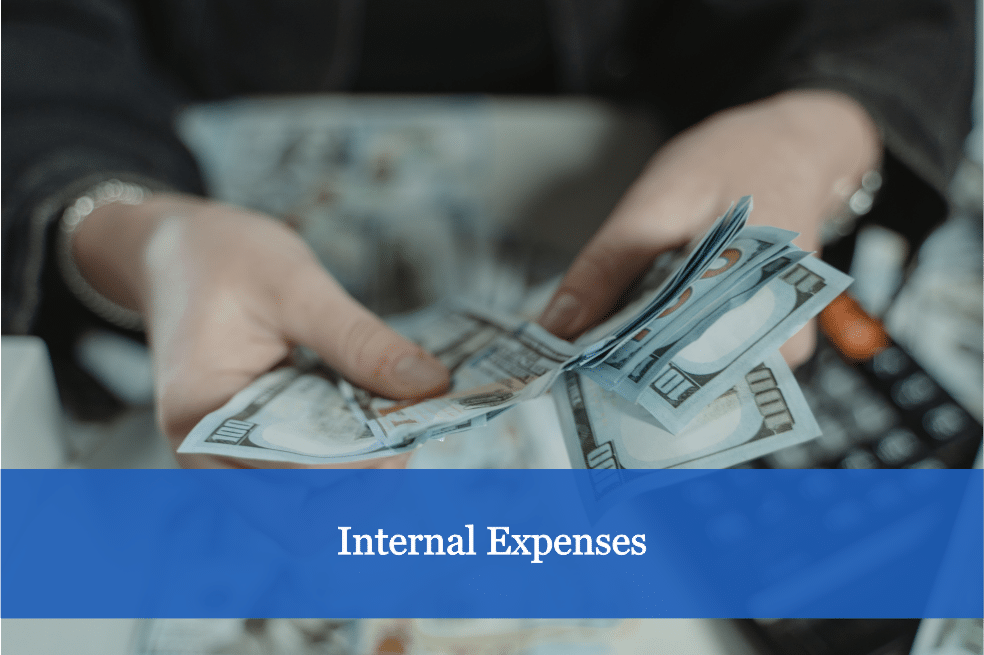
Cost 7: Internal Expenses
Internal expenses refer to the operational and administrative costs associated with fund management. These include fees charged by the fund company itself, such as custodial, recordkeeping, and trading costs, many of which are embedded within mutual funds, ETFs, and other investment vehicles. The specifics vary widely depending on the provider and investment product.
It’s important to clarify that using any advisor—whether at a large institution or an independent investment firm—does not eliminate these costs. They are often part of the structure of the investment product itself.
The purpose here is to raise awareness of additional layers of cost that may go beyond an advisor’s disclosed management fee. Understanding these internal expenses allows high-net-worth investors to make informed decisions about where and how their capital is deployed.

Cost 8: Actual Fee of Your Advisor
This is the cost most frequently discussed—the advisory fee itself. Most wealth managers charge around 1% of assets under management, with some applying tiered pricing for larger portfolios or offering performance-based compensation structures.
However, if the quoted fee seems unusually low, it may be offset by less transparent costs elsewhere, such as commissions on investment products, limited portfolio customization, or lack of ongoing oversight. In such cases, portfolios may be placed into pre-built investment models with minimal active management or individualized planning.
When evaluating total investment costs, it’s essential to go beyond the advisory fee and review the broader picture of fees, fund expenses, trading costs, and tax strategy.
Understanding these cumulative costs is a crucial step toward optimizing long-term financial outcomes, especially in the context of high-net-worth investment management. To explore how investment strategies, advisor selection, and fee transparency intersect with your goals:
Frequently Asked Questions
How does high net worth investment management help in reaching financial milestones?
High-net-worth investment management involves building a customized portfolio that aligns with an individual’s financial goals. It emphasizes long-term growth, income generation, and capital preservation by selecting a mix of assets suited to each stage of wealth accumulation.
What value do financial advisors add in high net worth investment management?
Advisors who specialize in high-net-worth investment management help clients evaluate complex strategies, including alternative investments and tax-aware planning. Their experience can be particularly valuable when navigating unique opportunities and financial structures available to those with substantial assets.
How does high net worth investment management approach ESG investing?
Environmental, Social, and Governance (ESG) investing may play a role in high-net-worth portfolios when aligned with a client’s values. Advisors can integrate ESG factors into broader strategies without compromising the overall risk-return balance, helping clients evaluate both financial and ethical considerations.
How does high net worth investment management approach risk and return?
A key element of high-net-worth investment management is optimizing asset allocation to balance risk and return. Diversification across asset classes, sectors, and geographies is commonly used to manage exposure and support consistent, goal-aligned outcomes.
Why might an individual choose professional high net worth investment management over self-management?
For those without deep investment experience, professional management can offer structured planning, risk mitigation, and access to specialized solutions. Working with a qualified advisor—especially one who offers fee-based or fiduciary planning—may help high-net-worth individuals avoid common pitfalls while pursuing long-term financial objectives.

